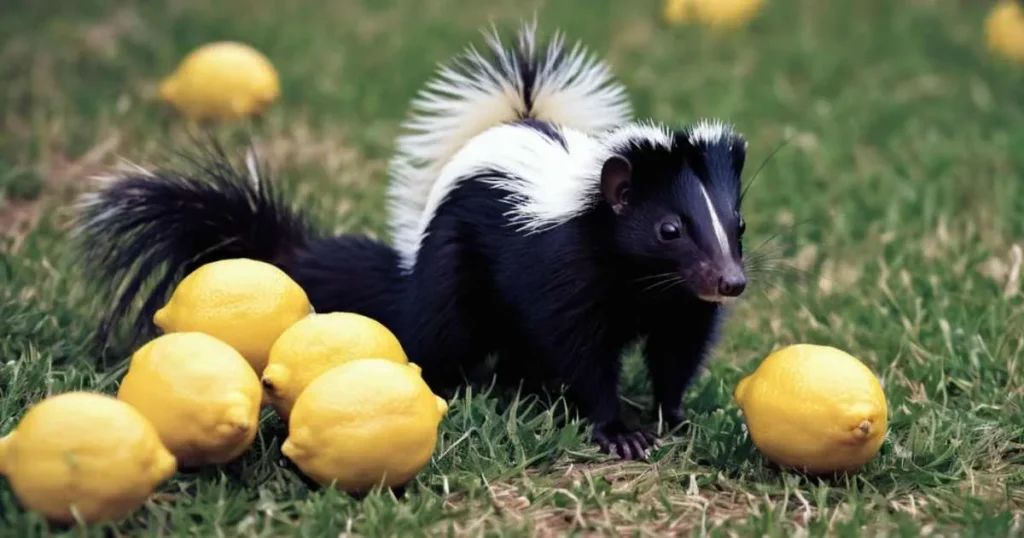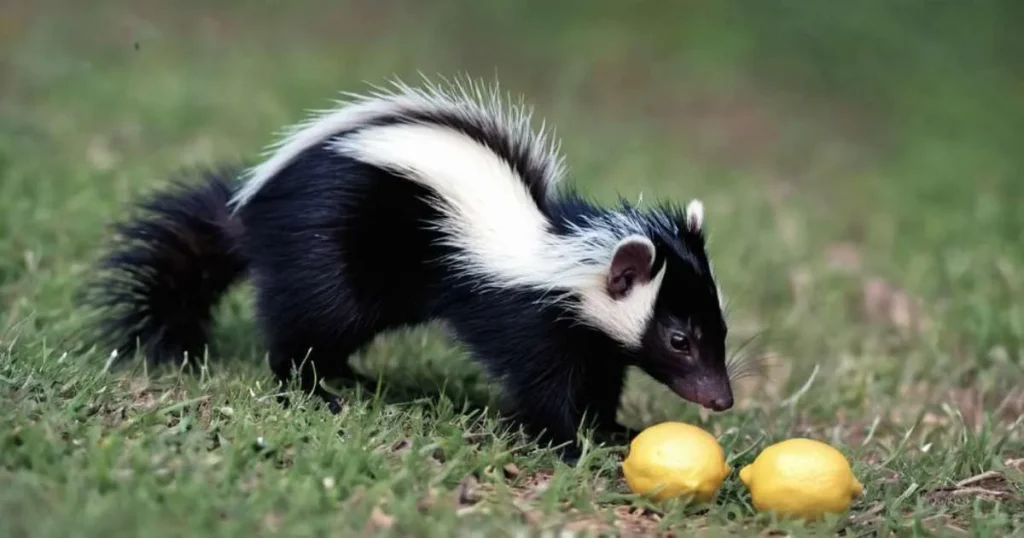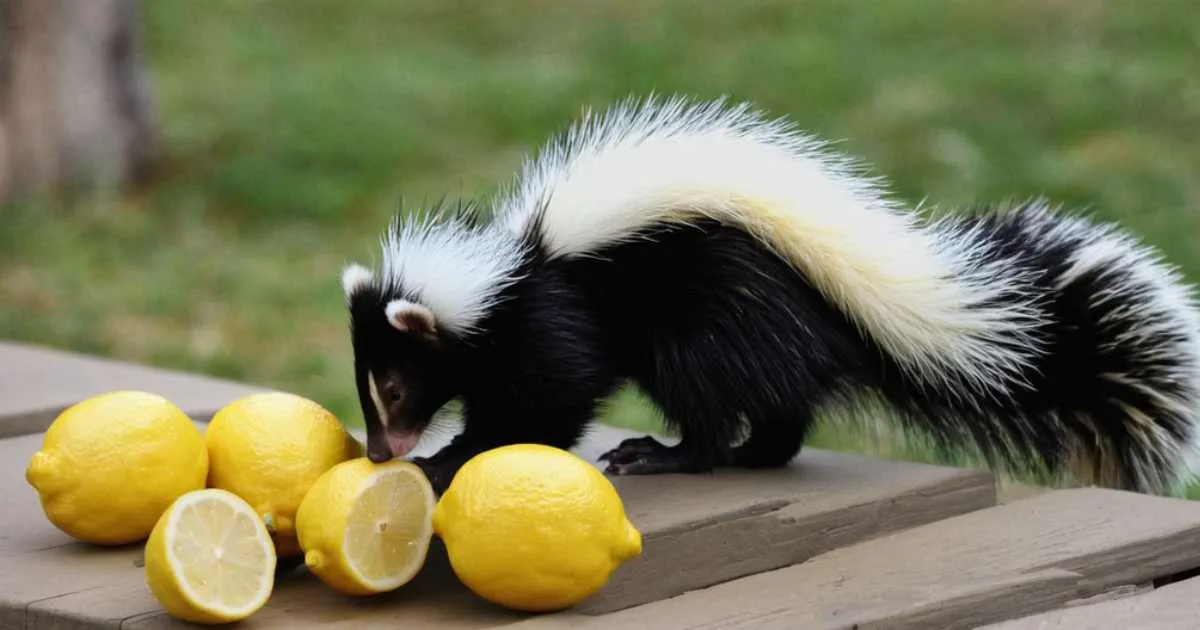Are Lemons Safe for Skunks? 5 Dietary Facts You Need
Last updated on August 11th, 2024 at 07:33 am
As a skunk pet owner and wildlife enthusiast, I’ve done a lot of research on what these curious creatures eat. So, do skunks eat lemons? Not really. While skunks have a varied diet that includes insects, berries, and even small rodents, citrus fruits like lemons are not their thing. The sour taste and acidity don’t appeal to them. Skunks are more likely to go for foods with higher protein and fat content. If you want to know more about what skunks like to eat and how they fit into our environment, keep reading to get the full scoop!
Skunks’ Diet Staples
Curiosity often sparks in the minds of those who wonder what creatures like skunks eat. While some might whimsically question whether skunks have a taste for tangy lemons, it’s essential to dive into what truly constitutes the staples of a skunk’s diet. Understanding these dietary choices shines a light on their foraging habits and natural instincts.
Natural Foods In A Skunk’s Diet
Skunks are by nature opportunistic eaters with a varied palette. Commonly found foraging at dusk or dawn, skunks thrive on a diet that includes:
- Insects – Beetles, larvae, and bees are a crucial source of protein.
- Fruits – Figs, apples, and berries add sweetness to their meals.
- Small rodents – Mice and voles provide a hearty feast for skunks.
- Eggs – Access to bird or reptile eggs is a bonus treat.
- Plants – Leaves and roots offer essential nutrients.
What Skunks Seek In Their Foraging
When skunks set out to forage, they’re on a mission for foods that provide:
- Sustenance – Food that fuels their active nightly lives.
- Protein – Necessary for growth and repair of tissues.
- Variety – Different food types prevent nutritional deficits.
- Seasonality – Skunks eat what’s available during different seasons.
Understanding the skunk’s search for food reveals the complexity of their dietary habits and shows that while they might encounter a lemon in their travels, it’s not a regular part of their diet. Skunks’ varied menu highlights their adaptability and the rich tapestry of food sources available in their natural habitat.
Citrus Fruits And Mammals
In the wild, mammals encounter a variety of foods, including the tangy and bright world of citrus fruits. Lemons, oranges, and grapefruits offer not just a burst of flavor but also a strong reaction from many animals. This reaction can vary from one species to another, and understanding it can offer insights into the eating habits and preferences of different mammals, including our question at hand: do skunks really enjoy lemons?

General Mammalian Reactions To Citrus
Citrus fruits often lead to clear reactions from mammals due to their high acidity and sharp taste. Mammals such as rodents, raccoons, and even primates may show an initial interest in citrus but are often put off by its strong taste.
- Digestive Discomfort: The high acidity can cause stomach upset in some mammals.
- Repellent Qualities: Citrus scent is a known deterrent for many animals.
- Selective Feeding: Some animals may eat the peel but leave the flesh.
How Citrus Can Affect Animal Behavior
Citrus can have an unexpected impact on the way animals behave. Research shows that the strong smell of lemons or oranges can lead to mammals avoiding areas where these fruits are present, potentially altering their feeding grounds and patterns.
| Animal | Reaction to Citrus | Behavioral Change |
|---|---|---|
| Skunks | Mixed; some ignore, some avoid | Possible aversion to areas with citrus |
| Raccoons | Often avoid due to scent | Change in foraging areas |
| Rodents | Sometimes repelled by citrus | Could deter nesting near citrus sources |
Skunks’ Sense Of Taste
Have you ever thought about what skunks enjoy munching on? Apart from their notorious spray, skunks have a diverse palate, though lemons don’t usually top their list. Understanding the skunk’s sense of taste reveals why certain foods appeal to them, and others, like sour lemons, don’t make the cut.
How Skunks Perceive Flavors
Skunks possess taste buds similar to humans. These allow them to detect basic tastes: sweet, salty, bitter, and sour. Their taste for sweetness helps them find ripe fruits, while bitterness might signal toxins. Skunks are generally omnivores, enjoying both plants and small animals.
The Impact Of Sourness On Skunks
Sourness, especially that of lemons, is a strong flavor. Skunks tend to steer clear of highly sour foods, which naturally include lemons. Their taste buds can sense sourness as a sign that the food is not ripe or potentially harmful. This instinctive avoidance keeps them away from many citrus fruits.
Lemons In The Wild
Welcome to the enchanting world of Lemons in the Wild. In this part of our blog, we dive into the habitat of lemon trees. We also explore whether these zesty fruits are on the menu for one of the animal kingdom’s most unique members—the skunk. Let’s embark on this citrus journey!
Lemon Trees’ Habitats
Lemon trees flourish in specific environments. They require a combination of abundant sunshine and well-drained soil. This type of climate is typical in regions like southern California, the Mediterranean, and parts of South Asia. In the wild, lemon trees prefer warm temperatures and minimal frost, creating lush, lemon-producing groves in these regions’ ecosystems.
| Climate | Soil Type | Temperature |
|---|---|---|
| Sunny | Well-drained | Warm, Frost-free |
Availability Of Lemons To Skunks
Do skunks stumble upon lemons in their natural habitat? Skunks are opportunistic eaters, meaning they often eat what they find. While lemons do not form a substantial part of their diet, skunks may eat these fruits if available. In regions where skunks’ territories overlap with wild lemon groves, they might nibble on a lemon out of curiosity.

- Skunks typically eat insects, small rodents, and plants.
- Lemon trees in wild areas may attract skunks with their scent.
- Skunks have a diverse diet; lemons can be part of it.
Skunks’ Interaction With Fruits
Imagine a skunk rummaging through your garden. What does it find? Surprisingly, these little critters are fancy fruits. Skunks’ diets are diverse, but fruits play a key role. Let’s take a closer look at their fruity feasts.
How Skunks Choose Their Fruits
When it comes to dining, skunks have a sweet tooth. They sense fruits with their sharp noses. Bright colors catch their eye. Skunks prefer ripe, fallen fruits. They like them easy to reach and full of flavor. Their tastes may not include lemons often. The sourness might turn them away.
Observations Of Skunks Eating Fruits
Witnessing skunks in action can be amusing. At night, they emerge to feast. Berries, grapes, and figs are common sightings. Watching them, one notes their method. Skunks take their time, savoring each bite. Though rare, lemon sightings are curious. Observations suggest lemons are not favorites. The acidity is likely too strong for their palates.
| Fruit Type | Skunk Preference | Reason |
|---|---|---|
| Berries | High | Sweet and easy to find |
| Grapes | High | Juicy and plentiful |
| Figs | Moderate | Seasonal availability |
| Lemons | Low | Sour and less appealing |
The Peculiar Case Of Lemons And Skunks
Imagine a skunk wandering in a lemon orchard, it might seem like a rare sight. After all, these black and white creatures are known for their pungent spray, not for a love of tangy lemons. But does the unlikely event ever occur where skunks indulge in these citrus fruits? Let’s explore the curious relationship between these creatures and lemons.
Instances Of Skunks Eating Lemons
Skunks are omnivores, and their diet typically includes fruits. While they often opt for berries and apples, there might be times when lemons catch their interest. Some residents living near lemon groves have reported skunk sightings, suggesting a potential lemon feast.
- Gardeners notice lemons with bite marks.
- Skunks were spotted near lemon trees at night.
- Citrus peels are found in skunk habitats.
The Rarity Of Citrus In Skunk Diets
It’s worth noting that skunks don’t typically seek out lemons. Their diet mainly consists of insects, rodents, and more accessible fruits. Lemons are not a common food choice for skunks, as the sour taste might be off-putting for them. Skunks eating lemons is a rare occurrence.
| Food Type | Commonality in Skunk Diet |
|---|---|
| Insects and Rodents | High |
| Fruits (Berries, Apples) | Moderate |
| Citrus Fruits (Lemons) | Low |
Considerations For Citrus And Skunks
Exploring the dietary preferences of skunks raises a quirky question: do these black and white creatures find lemons appealing? This section examines how citrus fruits like lemons fit into a skunk’s dietary framework and the likelihood of these two crossing paths.
Skunks’ Dietary Health
Skunks are omnivores, meaning their diet includes plant matter and small animals. Vitamins, minerals, and a balance of proteins and carbohydrates are essential for their health. It’s hard to imagine these mammals feasting on sour lemons, as their natural diet consists of:
- Insects
- Fruits
- Berries
- Small rodents
- Eggs
Citrus fruits like blueberries, are generally not a part of their dietary preferences due to their strong, acidic nature. Skunks require a specific pH balance in their diet to maintain good digestion and overall well-being.
The Likelihood Of Encounters With Lemons
Skunks, primarily nocturnal foragers, search for food in areas where human activity is minimal. A skunk’s encounter with lemons is most likely to happen in:
- Backyard gardens with fruit trees
- Compost bins containing discarded lemon peels
- Outdoor picnics where fruits are present
Although tempting, a lemon’s tangy scent and taste are often enough to steer skunks away. Instances of skunks eating lemons are rare but can occur out of curiosity or necessity. The actual risk of a skunk eating lemons is quite low. Human-skunk interactions are the typical cause for these unusual dietary choices.
Addressing The Myth
Curiosity often leads us down the garden path of odd questions. One such question that might have pricked your curiosity is: Do skunks eat lemons? It’s time to peel back the layers of this notion and find out if this citrus tale holds any truth.
Where The Lemon-eating Skunk Idea Originated
It seems like the internet is ripe with images and videos of animals eating unusual things. Some claim to have seen skunks nibbling on lemons. This rare sight might be the seed that planted this lemon-eating skunk myth.
Fact Vs. Fiction In Skunk Diets
Skunks are omnivores. This means they eat plant matter and meat. Their diet mainly includes:
- Insects
- Small rodents
- Fruits and berries
- Worms
- Eggs
But can you find lemons on the skunk’s menu? To answer that, it’s important to consider the skunk’s natural habitat and food preference.
Skunks live in diverse environments. From forests to urban areas, they adapt well. But their favorite snacks don’t include sour and acidic fruits like lemons.
Lemons are not a natural choice for these creatures. Lemons may even be harmful to skunks due to their high acidity. So, the idea of lemon-eating skunks likely remains just a myth.
| Skunk’s Natural Diet | Lemons in Diet? |
|---|---|
| Insects, Rodents, Fruits, Worms, Eggs | No |
In essence, skunks might occasionally encounter lemons, especially in a suburban setting, but these fruits are not a regular part of their diet.
Final Verdict On Skunks And Lemons
The curious case of whether skunks enjoy lemons comes to a close. People often wonder about skunks’ diets. Informative research and expert talks shed light on this subject.
Expert Opinions
Wildlife biologists share their insights. They study animal behaviors and diets. They provide valuable data on skunk eating habits.
- Skunks are omnivores.
- Their diet mainly consists of proteins and insects.
- Lemons are not a natural choice for them.
Still, some skunks might nibble on lemons. This action is more out of curiosity than preference.
Drawing A Conclusion From Evidence
We reviewed facts, watched skunks’ behaviors, and read studies. Here’s what we know:
| Aspect | Details |
|---|---|
| Natural Diet | Skunks prefer insects and small animals. |
| Lemon Consumption | Rare and not habitual. |
| Expert Consensus | Lemons do not attract skunks. |
In conclusion, skunks don’t seek out lemons. If they encounter lemons, they may taste them, but these fruits are not part of their desired diet.
Frequently Asked Questions
Lemons are not known to repel skunks effectively. Skunks have no natural aversion to lemon scent; other methods may be more successful for deterrence.
Skunks strongly dislike certain odors, especially those from citrus fruits, ammonia, mothballs, and predator urine, like that of dogs or foxes. These scents repel them effectively.
Skunks generally dislike the smell of citrus, finding it unpleasant. Citrus scents, such as lemon or orange, can therefore repel them.
Conclusion
Skunks have diverse diets, but lemons aren’t typically a top choice. Their natural instincts guide them to protein-rich foods over sour citrus fruits. Remember, while they might nibble out of curiosity, lemons aren’t a skunk staple. So, plant with assurance, your citrus grove is likely safe from these striped foragers.

